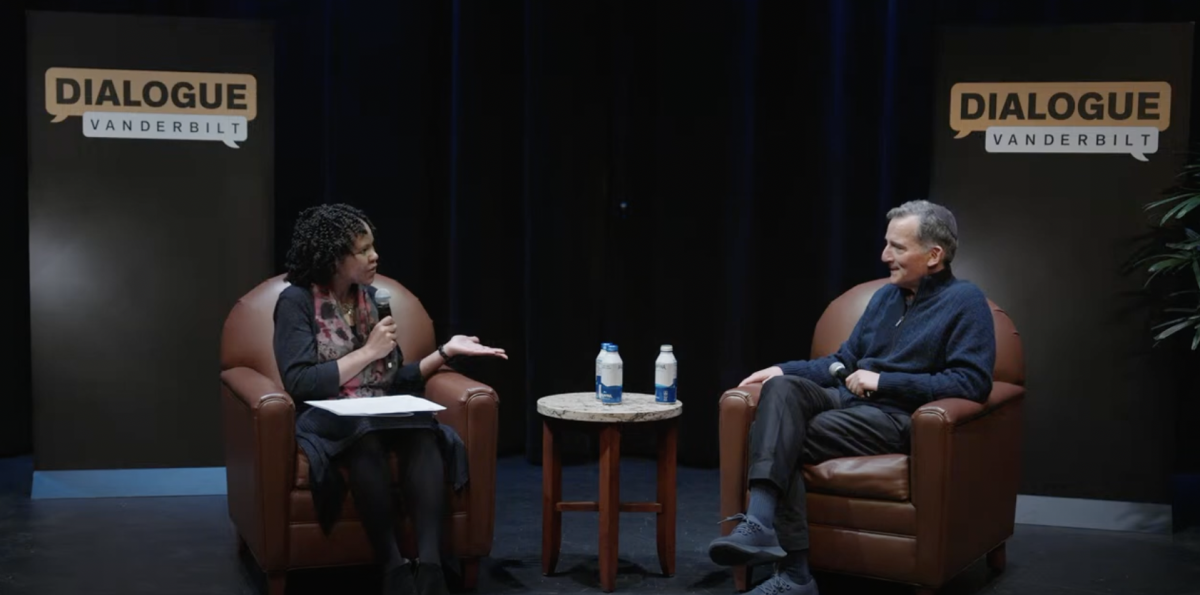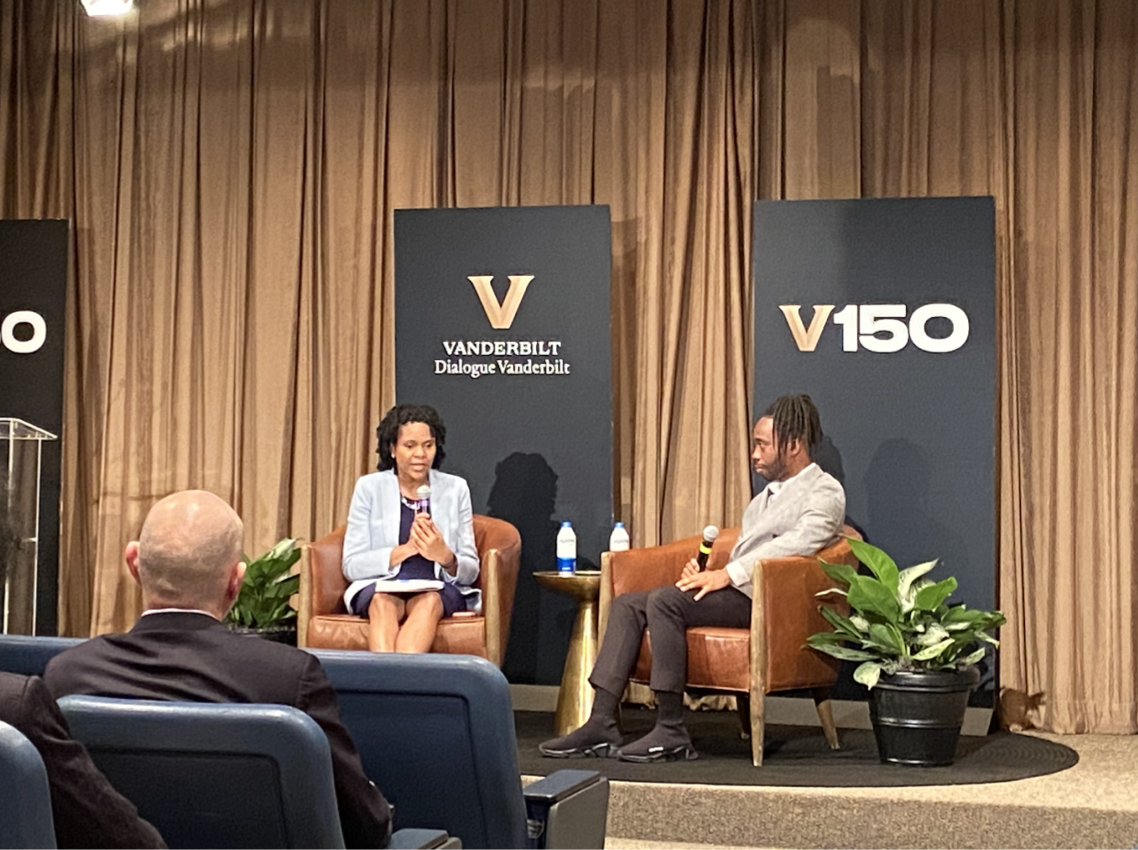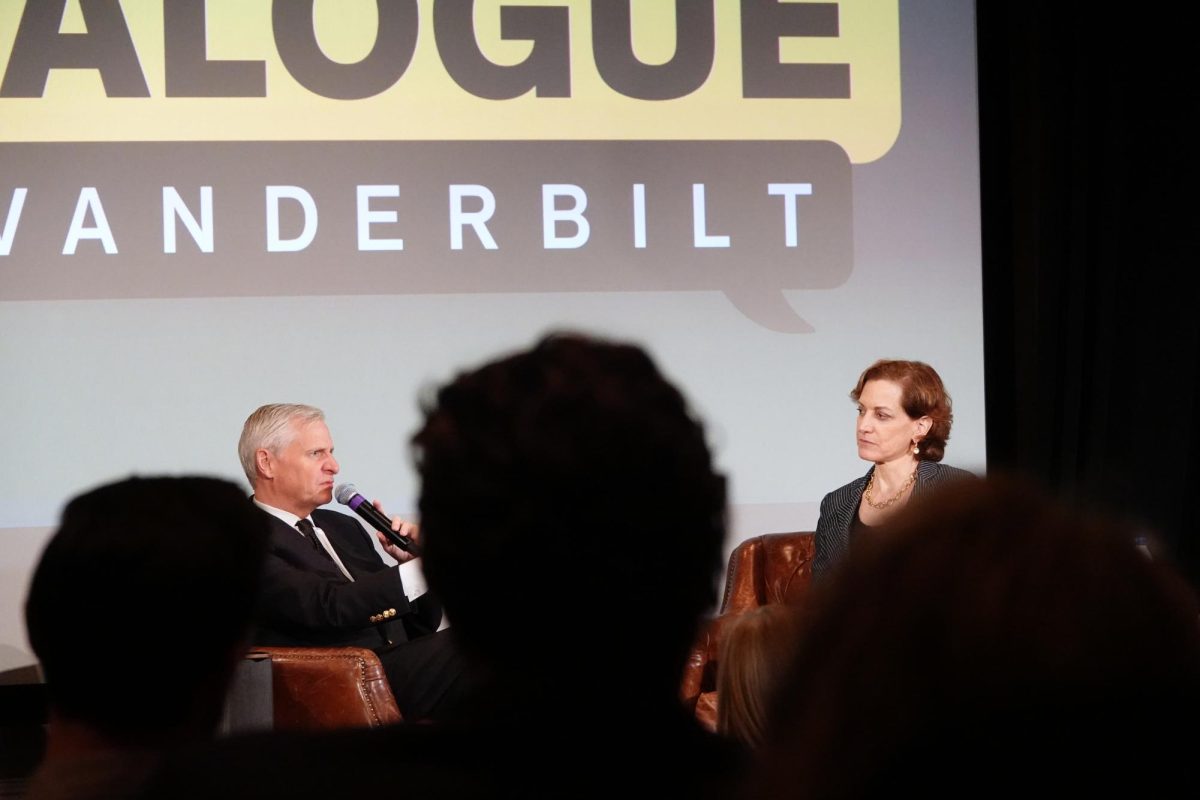The Vanderbilt Project on Unity and American Democracy hosted Rabbi David Wolpe and Divinity School Dean Yolanda Pierce on Jan. 18 for the first of a series of conversations with faith leaders as part of Dialogue Vanderbilt. The event was held as planned in the Rothschild College Black Box Theater, though audience attendance was moved to a virtual-only format via livestream due to inclement weather conditions.
Wolpe, called “the most influential rabbi in America” by Newsweek, recently made headlines for resigning from Harvard’s Antisemitism Advisory Group in the wake of former Harvard President Claudine Gay’s congressional testimony, deeming her words “painfully inadequate.” Wolpe currently serves as a columnist for New York Jewish Week and the Jerusalem Post, as well as the inaugural Rabbinic Fellow for the Anti-Defamation League, an organization whose stated purpose is to combat antisemitism.
The next event in the Unity Project’s faith-based dialogue series will feature Dean Pierce in conversation with activist Maha Elgenaidi on Feb. 22. Elgenaidi is the founder and executive director of Islamic Networks Group, whose stated mission is to foster peace and understanding between Muslims and other religious, racial, ethnic and cultural communities.
Diermeier’s opening remarks
The event opened with welcoming remarks from Chancellor Daniel Diermeier, who explained the role of the Unity Project’s faith-based dialogue series in the broader goals of Dialogue Vanderbilt.
“Today’s gathering aims to provide an open forum where we can explore the intersection of faith and the pressing issues that matter to us all, where we can share a range of perspectives and experiences through which we might come to better understand not only these issues but one another and our shared humanity, shared values and our shared purpose of moving forward together toward a better world,” Diermeier said.
Diermeier expressed solidarity with those in the Middle East and paid tribute to the lives lost.
“Our hearts are fervently with those who are grieving and suffering as a result of the conflict in Israel and Palestine and in both our global and our local communities,” Diermeier said. “The tremendous weight of this human suffering is present among us and thus we do not enter in today’s conversations lightly.”
Diermeier closed his remarks by criticizing “ideological bubbles” and “curated news,” encouraging students instead to engage in critical conversations.
“Our charge, after all, is to engage in urgent but ancient work, the work of Tikkun Olam — repairing the world, a world that we today often find broken and unfinished,” Diermeier said. “This is a lofty charge and difficult work for which we will need a wealth of tools, including how to speak up and how to listen, how to understand, to reflect, to challenge and debate respectfully and how to communicate effectively with others for the sake of needed change.”
Religion as a force of unity
Pierce began the conversation by asking Wolpe why he chose to pursue the study of religion and engage in religious work, given the “decline narrative” surrounding the topic. Wolpe explained that his devotion to religion is rooted in values and community, explaining that religion acts as a “source of contention” due to people’s differing belief systems.
“When you believe something, sometimes you get carried away by how much you should defend it, although I think religion is less a source of contention than most people assume,” Wolpe said. “Generally, when religion is a source of contention, it’s because other things are in play as well — land, resources, power.”
Despite divisions that can arise between those who practice different religions, Wolpe claimed religion can also function as a major source of unity. He pointed to the lack of community and a common vision among Americans as driving forces of the nation’s polarization.
“The greatest statement that the monotheistic faiths make is found at the beginning of the Bible which is that all human beings are created in the image of God,” Wolpe said. “So there you have the principle that actually creates this ability to tie human beings together, and I think if people took religion seriously — as opposed to my team versus your team — it’s the greatest force for human unity there is in the world.”
Wolpe further praised the U.S. for its coexistence of numerous different religious groups and democratic ideals, to which Pierce noted that certain voices remain excluded from public discourse.
Engaging in respectful conversation
Pierce asked Wolpe how he suggests students of different backgrounds engage in conversation surrounding the “deeply painful” conflict in the Middle East. Wolpe explained that those in close proximity to the conflict should be afforded the opportunity to remove themselves from conversations on occasion.
“Literally in the midst of a war, it is sometimes impossible to listen to someone whose position you feel assaults your essence,” Wolpe said. “We have to give space to the deeply invested to not listen sometimes to some things.”
When individuals choose to engage in conversation, Wolpe emphasized the importance of asking questions in order to reach common ground.
“If I’m insulting you or diminishing you or putting you in a category that is a morally reprehensible one, it’s going to be really hard for you to listen to me. And that’s why the best way, when someone expresses an opinion that you have a fundamental objection to, is to ask them as many questions about how they arrived at it as possible,” Wolpe said.
Pierce and Wolpe also spoke on the distinction between hate speech and free speech, with Wolpe explaining that tone and approach bear more weight than the content of one’s statement. Pierce also suggested that colleges have the responsibility to create environments that cultivate mutual respect, acknowledging that students may choose to remain silent for fear of being judged by their peers.
“Without creating forums where people can say stuff that is actually very, very difficult to hear, then we create an atmosphere where people would rather be silent than speak truth,” Pierce said.
Understanding history and seeking truth
Wolpe also emphasized the need for students to be educated on the history and context of the conflict in the Middle East, suggesting a widespread ignorance of history and the conflict’s roots. He attributed partial blame to social media and the press, alleging disproportionately high coverage of Israel in Western news as compared to other nations. A 2013 study found Israel within the top 10 nations most prominently featured in American news.
“There are genocides in the Sudan; there was a genocide in Rwanda; there were many, many more Syrians killed than have been killed in the whole history of the Arab-Israeli conflict in the last 20 years — in the last 10 years, probably — but there is no coverage of that, so there is no emotional reaction to it,” Wolpe said. “We have to ask ourselves: why is this the conflict that gets covered? And why does it get covered the way it does?”
Pierce noted that the “fullness of time” ultimately reveals the truth, responding to Wolpe’s reference to the misinformation surrounding the usage of and attack upon al-Shifa Hospital. She believes many Americans want to reduce the severity and death toll of the conflict but feel “powerless.”
For people to successfully engage in conversation about the conflict, Wolpe said they must acknowledge the suffering of all parties and accept the legitimacy of all peoples who exist in the Middle East.
Audience Q&A
Audience members were able to submit questions to Wolpe via an online form during the event. He affirmed that people can criticize Israeli policy without being antisemitic, pointing to the high levels of governmental criticism spread in Israeli newspapers.
“You can think what they’re doing is terrible and say what they’re doing is evil, and that’s not necessarily antisemitic. Just to say, ‘and therefore they shouldn’t exist’ — that steps over the line,” Wolpe said.
A Jewish student asked Wolpe for advice about having to defend his people’s legitimacy and right to self-determination to his peers. Wolpe responded by commenting on the “strange position” Jews hold in American culture, claiming that they are placed in binary categories that often erase their nuanced history.
“To some people, Jews are white. To other people, Jews are not white. If you go to Israel, more than 50 percent of Israel’s population actually comes from the Middle East,” Wolpe said. “I don’t know how to help complexify people’s notions of what Jews are — Jews are a people that have been tremendously oppressed that have also had, portions of them, great success.”
Wolpe denied that the Israeli-Palestinian conflict is one of race, citing again the proportion of non-European Jews and calling the application of American racial conflicts to the Middle East a “category error.” Debate exists among activists and scholars surrounding the role of race in the conflict.
Wolpe concluded the conversation with a message of hope.
“There is so much that is good and kind and right. I really do believe that God gave us everything we need to make this world better; it’s just that we haven’t always risen to the challenge,” Wolpe said. “But I see potential and possibility everywhere including profoundly and deeply — and I want to say gratefully — in the person sitting across from me.”
















